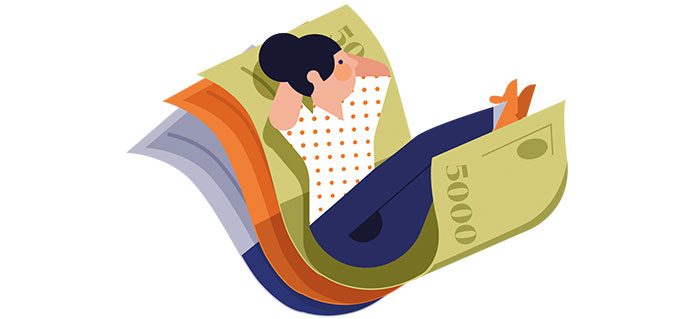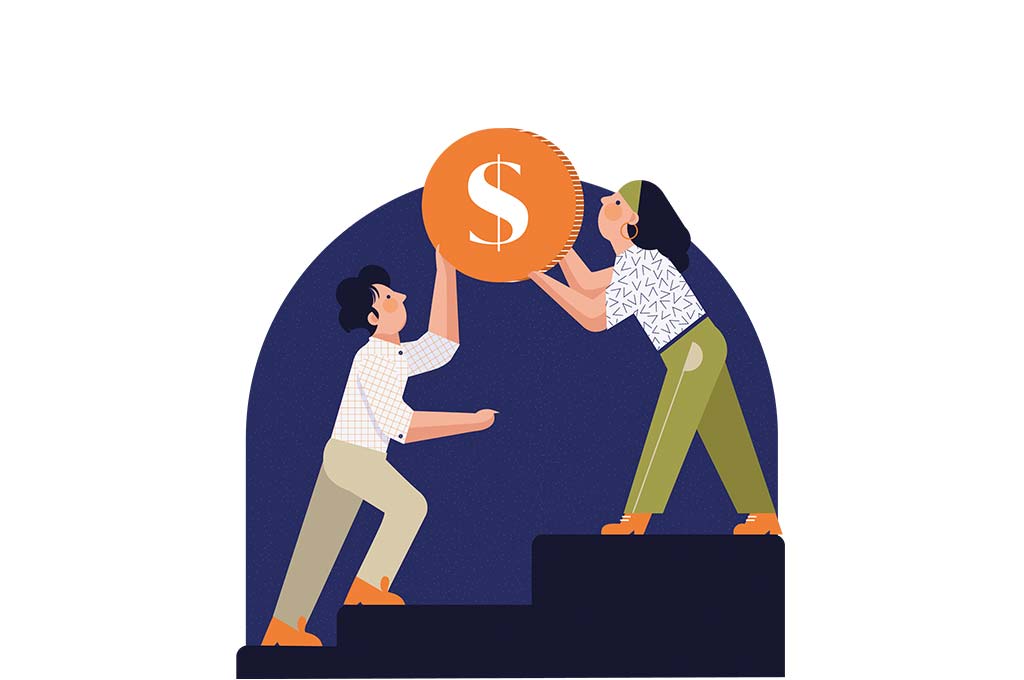
IESE Insight
Restoring trust in capitalism
Capitalism relies on a trust-based system. Even though citizens have lost trust in the economic/financial world and public entities, it’s not too late to regain it, as IESE Prof. Jordi Gual explains in his new book.
Human beings are social creatures. Our social interactions — with friends, family, colleagues and even the strangers we cross paths with daily — are what influence us, more than money and material goods, despite living in a capitalist economy. We’re not isolated individuals, existing in a vacuum. What happens around us — politically, socially, economically — affects us all. Our wellbeing depends on and concerns others’. Even the so-called “free” market economy depends on social networks to function well.
In this interview, IESE Economics Professor Jordi Gual explains how trust plays a crucial role in capitalist economies and why, in recent decades, citizen trust has decreased. It’s the basis of his new book, Confiar no tiene precio (Trust is priceless), which partly draws upon his experience as Chairman of CaixaBank (Spain) between 2016 and 2021.
Why is trust so important for capitalism?
The market economy is an impersonal system of economic transactions. People exchange goods and services at prices that are, in most markets, freely set by the market players themselves. However, because not all market transactions or contracts are foolproof, business operations can get complicated. Only when there is a baseline of trust can business relationships flow smoothly and be profitable.
Let me give an example: Cryptocurrencies emerged to avoid transactions that relied on banks or central institutions. However, precisely because the identity of people trading in the digital currency space is unknown, there have been numerous scandals stemming from dishonest players who are shielded by anonymity.
A company must earn the trust of its customers and employees. At the same time, society tends to place its trust in companies whose primary objective is to address societal needs through their products and services. The company must be profitable for the sake of fulfilling this function.
Trust is also crucial for public institutions. As Confucius observed thousands of years ago: Public authorities can lead without armies, even without food, but not without the trust of those they govern.
What does trust look like in Spain? And how does that compare with other free-market democracies?
According to the World Values Survey (2017-2022), 41% of respondents in Spain indicate that “most people can be trusted,” a percentage that aligns with the European average of trust. In Germany, that figure is at 44.6%, and in Italy, 26.6%. Nordic countries fare much better, with figures exceeding 60%. In Denmark, the percentage of trust is at 73.9%; in Finland, 68.4%; and in Sweden, 62.8%.
At the other end of the spectrum in Europe is Greece, where only 8.4% of respondents say they trust others. Eastern European countries such as Romania and Bulgaria have similarly low numbers at 12.7% and 17.1%, respectively.
For reference, 37% of respondents in the United States say they feel most people can be trusted — a percentage that has been declining for some time now.
Generally speaking, when trust in others is low, it can extend to public entities, including government bodies, political parties and policymakers.
What has caused trust in others to decrease so much?
In recent decades, the world has undergone profound transformations on several fronts. The global economy and people’s lifestyles have been drastically altered, affecting our collective sense of stability and our expectations of the future. Years of rapid globalization have led to economic migration, offshoring of production and significant changes in Asian economies, particularly with regard to China. We have experienced a digital revolution, culminating in new AI technologies that are already affecting our workplaces. What’s more, climate change is affecting the way we approach energy, creating tense debates within society.
All this has taken place in a macroeconomic environment characterized by greater instability, reaching a peak with the global financial crisis of 2007-08. The more recent COVID-19 pandemic amplified people’s sense of insecurity and anxiety.
In many countries, citizens feel their existing economic and political systems are not living up to expectations. A rejection of capitalism and liberal democracy is on the rise. Trust in large companies and public institutions is being undermined.
We see this in the financial sector, a part of the economy that is especially reliant on trust. We place a lot of trust in the private banks where we deposit our money, in the people we loan to, and in the central banks that issue our currencies. That is why the financial crisis of 2007-08 had such a dramatic effect: It highlighted what can happen when overly accommodating monetary and regulatory policies go on for too long. When the bubble burst, it damaged the credibility not only of the financial system but of the entire market economy itself. For the average citizen, the global financial crisis was unfair, incomprehensible and, in many cases, had unanticipated, lasting negative consequences.
Can you elaborate on how the response to the financial crisis fomented distrust?
First, because it was a debt crisis, businesses and households had a hard time regaining financial balance and the recovery was slow. There were also policy errors: a delay in cleaning up balance sheets, and banks were required to accumulate capital too quickly. On top of this, in Europe, we didn’t have a fully integrated financial market and there were many fiscal authorities; that is, we had the additional suffering of a still-developing monetary union.
Second, monetary interventions went on for too long. This led to a policy of negative interest rates that lasted for many years, with multiple adverse effects, especially on people’s savings.
Third, there was a lack of proper communication from public administrations. It wasn’t made clear enough to citizens that the bank bailouts were an attempt to prevent the collapse of the financial system so that the deposits of citizens remained protected. This, along with difficulties in holding individuals accountable for the firms that went bankrupt, created distrust toward the economic/financial world and policymakers. What’s more, fiscal and redistribution policies, which could have alleviated the consequences of financial instability on the population, didn’t solve the problem.
Overall, our fiscal policies didn’t deal effectively with the impacts of the financial crisis. In Western democracies, the public sector tends to accumulate deficits, which prevents it from acting as a counterbalance to unexpected negative shocks like the 2007-08 financial crisis, the COVID-19 pandemic or the war in Ukraine. Fiscally prudent countries, such as Denmark or Finland, have successfully avoided the accumulation of public deficits — and therefore, of debt — allowing for a better response to unprecedented events. Not surprisingly, they tend to be the countries where trust in others — and in the state — is greater.

While redistribution policies across continental Europe have helped reduce some income inequality, they still fall short of providing the necessary opportunities for the most disadvantaged segments of society. That’s because redistribution policies can generate distrust if they are used solely for electoral purposes, resulting in an appropriation of state resources by political elites to stay in power. In countries where this has happened, citizen disillusionment with their economic and political systems has gone up.
What about private companies: what societal responsibilities do they have?
Because public policies have failed to meet people’s needs, there’s demand for private companies to step up and play a more active role in addressing society’s biggest problems. Many businesses can take on this challenge by clearly defining their corporate purpose, aligning it with meeting societal needs and contributing to solving social issues.
The company must, of course, be profitable, otherwise it won’t be able to achieve its purpose. A company that isn’t profitable and can’t pay its shareholders for the risks they have taken in investing in the company will simply disappear from the market. And although profitability is not an end in and of itself, it is essential in ensuring the company’s goals are met.
That being said, purpose-driven companies create an atmosphere of trust and commitment among all their stakeholders. This is the foundation of their competitive advantage, and it’s a way to gain society’s trust.
Your new book argues that capitalism is facing a backlash because people feel insecure about their jobs, their pensions and the precariousness of the welfare state. How can this situation be remedied?
Globalization is often blamed for these things — used as a scapegoat by politicians because it’s an external enemy. Politically speaking, it’s more advantageous to blame outsiders than to recognize one’s own shortcomings in failing to improve the quality of the workforce or the education system.
Capitalism, on the other hand, is an efficient system for generating wealth, although it doesn’t necessarily distribute that wealth equitably. As I mentioned before, public policies have not fulfilled their function of providing for the common good because they have been used too shortsightedly, using public spending to win votes or to satisfy special interest groups that support the political parties in power.
In order to revitalize capitalism, we must acknowledge that individualism — which is an essential part of the current political and economic ideology — should be complemented by altruism. The good news is that altruism is innate to us as social beings and it is a necessary means of fomenting trust in each other. Trust ultimately leads to better social cooperation, promoting the creation and development of institutions and economic growth.
If what we need is more trust and everyone would benefit from it, why is it so hard to obtain?
Trust is a valuable asset, but it can’t be bought; it arises naturally in human interactions. And although it’s priceless, it can be costly. That’s because when we trust someone, we take a risk. Other people may disappoint us, even if it’s unintentional, because they don’t meet the expectations we’ve placed on them.
Likewise, if someone places their trust in us, we’re assuming a lot of responsibility. If we’re selfish or think only of ourselves, it will be difficult for others to trust us because trust requires benevolence. It also requires having shared values of honesty, loyalty and commitment. When we trust someone, we expect them to act in our best interests without asking them to prove themselves. In the words of philosopher Annette Baier: “Trust is the pleasant feeling that others are with us in our endeavors.”
It’s also important for societies to have a shared concept of justice. Trusting others involves judging their behavior in unforeseen circumstances, and it’s imperative to agree on what behaviors are considered morally or ethically correct. In today’s complex societies where many cultures coexist, reaching this agreement isn’t always easy.
Trust, or distrust, can spread quickly. If we accept the trust that others place in us, and if that trust is validated by our actions, we can contribute to a virtuous circle of trust. This is why every single person’s behavior is important. Our actions will either foment trust or hinder it.

What can public entities do to regain trust?
Societies with higher levels of trust — placed on fellow citizens as well as on public entities — tend to be societies where altruism extends beyond one’s close circle of family and friends. In these societies, people care about the common good and collective pursuits.
One way to create trust is by ensuring that public institutions remain politically neutral and serve the interests of the entire population, rather than favoring any one specific political party. What’s more, discrimination can never be tolerated, and professionalism must always prevail.
European countries with the highest levels of trust are those that have an active and demanding civic society. These countries do not necessarily have higher levels of public spending or a government that plays a more active role in providing for citizens’ welfare. Instead, these are countries where the financial stability of the public sector is prioritized. Moreover, their social inclusion policies are not merely about wealth redistribution via taxes and regulation, but a set of actions aimed at the inclusion of every individual in the labor market and in the social fabric. That’s how trust can be restored. With policies that foster the common good.
MORE INFO: Confiar no tiene precio (Trust is priceless) by Jordi Gual is published by Penguin Random House (2024).
This interview is published in IESE Business School Insight magazine #167 (May-Aug. 2024).



